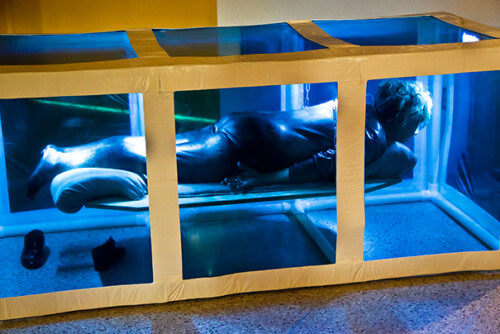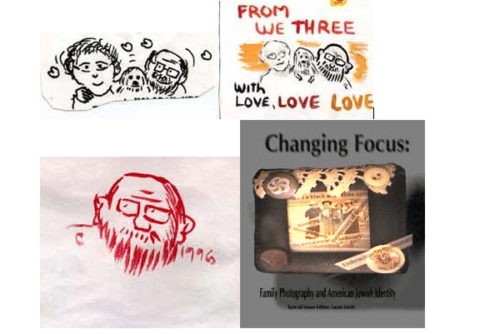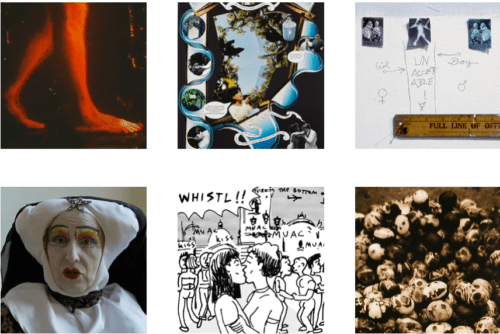The Coffee Prince and His Fans
While the previous examples have tended to associate transfemininity with the plight of extreme individuality—with Lin Guo Hua depicted as an isolated wallflower and Harisu or Choi Han Bit as a standout beauty—a different set of class and collective politics seem to accompany popular representations of transmasculinity in the region. As the celebrated Korean television melodrama, The First Shop of Coffee Prince, demonstrates, the Asian family unit can perhaps tolerate forms of gender variance that simultaneously serve to express filial piety or devotion to family hierarchy. Produced by the Munhwa Broadcasting Corporation and originally airing in 17 episodes during the summer of 2007, Coffee Prince is about the oldest daughter of a working-class, single-parent family whose tomboyish ways are meant to make an instinctive kind of sense in a household where the father has died, the mother is a silly shopaholic, and the little sister is talentless but boy-crazy. The series trailer shows the main character, Eun Chan, routinely chest-binding in order to keep a job at the Coffee Prince café, and the show itself veers daringly between the homosocial and the homoerotic as the cross-dressed Eun Chan explores a range of possible relationships with male coworkers.
Video 2: Series trailer for The First Shop of Coffee Prince, first shown on broadcast television by the Munhwa Broadcasting Corporation in South Korea in 2007.
While actor Yoon Eun-hye (윤은혜) has been widely praised for what we might call her performance of gender realness, her character’s “stealth” role—as the nondisclosure of trans identity is called in the US context—has proven crucial to mainstream reception of the series (as part of the pop culture phenomenon of the “Hallyu” or the “Korean Wave”) throughout the region. Eun Chan’s physical labor at a variety of food service and light manufacturing occupations is what keeps the family together and, in a tautological fashion, this labor both masculinizes her in the public sphere and marks her masculinity as acceptable on the domestic front. Whereas a rights-based discourse of trans identity (as reflected in the Yogyakarta Principles, for instance) would characterize this disjuncture between public and private performances of identity as impairing or infringing on personal freedom, in Coffee Prince it is this very disjuncture that ensures the family’s economic survival.
In fact, the concept of stealthness—to which a posttranssexual politics is distinctly opposed—resonates strongly with existing scholarship in Chinese gender and sexuality studies on the nonexistence of the “closet” in neo-Confucian societies. Hong Kong scholar Chou Wah-Shan (周華山), for instance, uses an essentially Foucauldian logic to claim that the notion of a “homosexual person” did not exist in Chinese language or culture until the advent of LGBT identity politics in the 1980s. 26 Best known for popularizing the term, tongzhi (同志), as an appellation for queer communities in Chinese-speaking territories, Chou has claimed that the “family kinship system rather than erotic object choice is the basis of a person’s identity” in contemporary Northeast Asian settings. He continues:
Since everyone, irrespective of sexual orientation, is expected to get married […] nobody can be primarily a lesbian, bisexual, or gay man. Everyone is, first, a daughter or son of her or his parents, which is a role in the social-familial system, before she or he can be anything else. 27
Although Chou fails to mention the “T” in LGBT here, it is clear how the stakes of intersubjective or collective personhood might be raised—and how this social-familial system might be threatened—when it is precisely the daughter who becomes a son, or the son, a daughter. Forcible SRS in this sense serves to stabilize and to fix a gender variance that threatens to undermine the family hierarchy; the possibilities for alternative kinship relations are kept contained within a single generation, as the trans individual is forced to exchange any reproductive agency for a legal relationship with the state. Indeed, Chou might be answering Judith Butler’s pointed question—“Is kinship always already heterosexual?”—with a resounding “yes,” since his project to identify local forms of accepting and tolerating homosexuality, which, he argues, are indigenous to Confucian cultures, offers virtually no resistance to what Butler cites as the “transmission of culture through heterosexual procreation.” 28
In her stealth or cross-dressing role, Eun Chan is not quite implicated in the discourse of forcible SRS, but she nonetheless remains subject to those coercive practices of kinship which alone can confer personhood, as Chou argues. While Eun Chan’s gender identity is shaped by her physical labor, it is the affective labor of trans kinship—of being both son and daughter—that has “K-drama” fans in the Global North riveted. For instance, consider how the wiki called “Fanlore” describes Coffee Prince for prospective viewers:
The series touches on issues of trans and gay characters without ever truly depicting either. There are scenes of Eun Chan binding to appear more masculine and she makes an effort to speak and move like a man, but she is never represented as a transman. Similarly, even though Han Kyul believes Eun Chan is a man while clearly falling in love with her, the relationship is always understood by the audience and Eun Chan to be heterosexual. These themes of sexuality and gender identity make Coffee Prince a perfect fit for a lot of Western media fans and the series has had a lot of crossover interest. The series is often the first suggestion by kdrama fans when a newbie asks where to start watching. 29
In stating that Coffee Prince references trans culture and homosexuality without “truly depicting either,” the Fanlore wiki is pointing as much to the absence of a viable LGBT identity discourse in the narrative as it is foreshadowing the ultimately heterosexual resolution of the K-drama’s central romance (after 15 of the 17 episodes). However, it appears that this implicit criticism—this sentiment that the characters are almost but not quite trans or gay—is intrinsic to the “crossover interest” that Fanlore assigns to Coffee Prince.
If forcible SRS undergirds a model of kinship that is always already heterosexual, the blog of the Washington, D.C.-based film reviewer, Trevor Link, suggests that Eun Chan’s performance of trans kinship is still not quite heteronormative, either. Accustomed to reviewing independent and foreign film, Link names Coffee Prince as only the second K-drama he has ever watched, and he identifies his perspective here with that of Han Kyul, the male lead.
For the typical heterosexual male, this show has a potentially queering effect that is impossible to displace. There’s really nowhere to hide from the consideration of whether or not he could be attracted to another man. It helps that the actress who plays Eun-chan, Yoon Eun-hye, is not only stunningly beautiful but, more importantly, androgynously so […] Thus, in its shy reticence, in its seemingly conservative prioritization of love over sex, “Coffee Prince” goes a lot farther than the majority of narrative works in probing the questions about our gender and sexuality that we’re too afraid to ask of ourselves. 30
To the implicit question—Why should viewers in the United States watch Coffee Prince?—Link answers: because the series is queerer than we are. Like the previous fan commentary, Link’s review seems to take advantage of the absence of identitarian discourses on gender or sexuality in Coffee Prince in order to produce a thoroughly queer reading of the semiotics of sexual attraction between Han Kyul and the chest-binding Eun Chan, who moves and talks like a man. However, the collective subject that Link invokes, the “we” who are afraid to ask ourselves questions, corresponds to a mainstream US audience imagined as the self in the solipsistic self-other relation that orientalism entails. Although Link’s high praise for Coffee Prince results from this self-reflexive form of reception, his impulse to emulate Asian sexual mores indicates a mode of globalized consumption that tends to discard a foreign cultural object once it has asked how Americans can do it better.
It is a fortuitous coincidence, however, that Link should characterize Coffee Prince’s stance on sexuality as one of “shy reticence.” Taiwanese scholars Liu Jen-peng (劉人鵬)and Ding Naifei (丁乃非) have mobilized the term, “reticent politics,” precisely to counter Chou’s valorization of the neo-Confucian social-familial system that, in its coercive practices of kinship, might “actually enable or facilitate the workings of an unfamiliar ‘gentle’ homophobia or constitute homophobia as effect.” 31 They continue:
We suggest that just as person-hood is—in Taiwan if not in other Chinese-language worlds—inextricably tangled, intensely cathected to parental/familial relations in impure “modern” forms, so too have the rhetoric and politics of tolerance and reticence retained powers while articulating new disciplinary and rhetorical forces, always deformed and deforming, especially in the field of sexuality in/around the family. 32
It is certainly possible to consider forcible SRS as the ultimate expression of reticent homophobia—as the homophobic act that need not speak its own name—because of its straightening and leveling effects on the family hierarchy and family lineage. To do so, however, would be to exclude from our view trans people who do undergo SRS and, in so doing, are helping to shape and define the emerging and vital category of trans citizenship. Indeed, when Butler reframes her question about heterosexual kinship in the form of another—“Who may desire the state’s desire?”—she is shifting our attention from sexual acts to those techniques of governmentality that may directly exploit the “impure ‘modern’ forms” (of being a parent, being a child, being in love, and so on) in which persist our psychic desires for the cultural recognition that confers personhood. 33 It is therefore necessary to consider what increased access to body modification technologies in the Asia-Pacific region might mean for the formation of various kinds of political subjects in the context of trans postcoloniality, where a hybrid or impure conception of modern identity leaves us little recourse to notions of somatic integrity or coherent subjectivity.
It is also in this context that US-based fans of Coffee Prince are deploying conceptions of queerness. The US-based fans who wish alternately to relate to Eun Chan as a transman and as an androgynous woman are themselves performing a queer consumption of K-drama fandom that reinstates a neoliberal notion of sexual autonomy at the very site of coercive practices of trans kinship. (Indeed, the title of another popular K-drama called “개인의 취향” has been translated, “Personal Preference.”) Where the dominant narratives of gender variance in Korean Wave media correspond either to stealthness or to biomedicalization, however, the demand for queerness that persists in fan culture may function as an important staging of alternative desires: the desire, for instance, to take a perverse pleasure in the extended and overlapping shots of Eun Chan’s chest-binding ritual in the series trailer, which puncture and suture the montage of her working-class life in modern-day Seoul, and which offer even—or perhaps especially—the uninformed viewer a kind of jouissance in escaping and exceeding the regime of forcible SRS. In an illustration of the transnational feminist connectivities that reveal both complicity and subversion at sites of gendered, sexual, and racial formation, it is clear that LGBT identity struggles in any locality may have little to do with what fans anywhere recognize as queer. However, this seemingly failed political engagement is precisely what global fandom’s mediation and, ultimately, its critique of sexual modernity discourse may depend on.
- Chou Wah-Shan, Tongzhi: Politics of Same-Sex Eroticism in Chinese Societies, (New York: Routledge, 2000): 1. [↑]
- Wah-Shan 2000: 20.[↑]
- Judith Butler, “Is Kinship Always Already Heterosexual?” differences 13.1 (2002). Rpt. in Undoing Gender, (New York: Routledge, 2004): 144.[↑]
- See http://fanlore.org/wiki/Coffee_Prince.[↑]
- Trevor Link, “A Radical Narrative Disguised as a K-Drama: Coffee Prince, Gender, and Sexuality,” 2 Apr. 2012. http://occupiedterritories.tumblr.com/post/20352079019/a-radical-narrative-disguised-as-a-k-drama-coffee. Accessed 1 May 2013.[↑]
- Liu Jen-peng and Ding Naifei, “Reticent Poetics, Queer Politics,” Inter-Asia Cultural Studies Reader, eds. Kuan-Hsing Chen and Beng Huat Chua, (New York: Routledge, 2007): 397.[↑]
- Liu and Ding 2007: 398.[↑]
- Butler 2004[2002]: 111.[↑]



